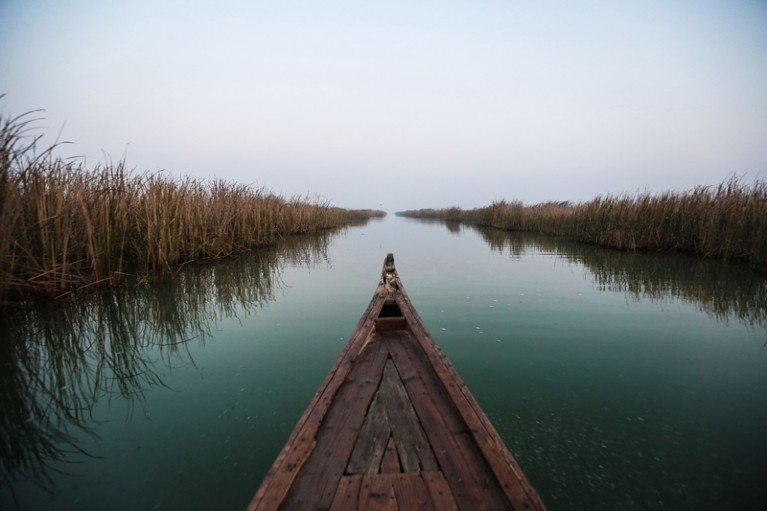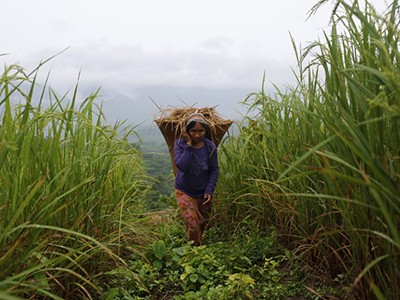
Iraq’s wetlands are threatened by climate change; the country is pivoting its research towards the SDGs.Credit: Murtadha Al-Sudani/Anadolu Agency/Getty
With the United Nations Sustainable Development Goals, world leaders pledged to end poverty and hunger, protect biodiversity and the climate, and get all children into schools by 2030. How have researchers and funders responded? Has there been a shift in research priorities?
The UN’s Paris-based science and education agency has answers to these and other questions in the latest UNESCO Science Report, published last month (see go.nature.com/3zlojva). UNESCO says the 700-page report is a first attempt at understanding the impact of the Sustainable Development Goals (SDGs) on research priorities. The findings are a mixed picture.
Using the Scopus database, UNESCO mapped publications from almost 200 countries between 2011 and 2019 on 56 research topics relevant to the SDGs. For the most part, the high-income countries that account for 64% of the world’s research spending — including Japan, South Korea, the United States and many European countries — showed relatively little change in the number of publications produced concerning the SDGs, and a declining share of global research.
How science can put the Sustainable Development Goals back on track
But it’s a different story for low- and middle-income countries, which have begun to shift their research priorities towards the goals.
For example, the share of publications on photovoltaics — which could address the SDG on boosting renewable energy — from low-income and lower-middle-income countries more than trebled, going from 6.2% to 22% of the world total in the study period. The share of papers on biofuels and biomass nearly trebled, from 8.5% to 23%.
Low-income countries more than doubled their share of research publications on crops that are more resilient to climate change, from 5% of the total to 11%. And researchers from sub-Saharan Africa contributed 361 out of 885 publications on smallholder farming in 2019 — more than the European Union’s 294. Ecuador, Ethiopia, Indonesia, Iraq, Russia and Vietnam all increased their output on most topics, albeit from low starting points in some cases.
Much of the growth is powered by China. According to UNESCO, China’s researchers now publish around half of the world’s output on battery efficiency, 43% on hydrogen energy and 41% on carbon pricing. Their research on carbon capture and storage increased from 1,300 publications between 2012 and 2015 to 2,049 in 2016–19. By contrast, high-income nations — including France, Germany and the United States — showed declining shares during the same period, and some showed declining numbers. One exception is research into floating marine plastics. The field, which barely existed a decade ago, recorded 853 publications in 2019, mostly from high-income nations. But, overall, wealthier nations reported falls in their share of publishing across 54 out of the 56 fields assessed.
Does the fight against hunger need its own IPCC?
It’s disappointing to see so little progress from the richer countries. But it is something of a pattern. UNESCO’s researchers calculated that, between 2000 and 2013, wealthy nations spent less than US$25 billion on international development assistance in environmental areas such as climate change and biodiversity — about one-fifth of the $130 billion given for assistance in industry and innovation.
At the same time, it’s heartening to see scientific output being slowly revived in many low-income countries — some of which were engines of scholarship in times past. But UNESCO also finds that funding trends in these countries have become harder to track. Some 98 countries reported funding data in 2015, but this fell to 68 in 2018. Some 28% of high-income and 78% of low- and middle-income countries are not reporting their science-funding data — and that is both problematic and troubling. The ability to correlate funding data with publishing information would provide a richer picture of the gains, and identify areas that would benefit from more resources. Countries need to comply with UNESCO’s requests for information, partly because they are obliged to track these data for the SDGs.
Even before the pandemic, the world was not on track to reach most of the Sustainable Development Goals. With less than a decade to go before the 2030 deadline to end poverty and protect the environment, the UNESCO report aptly says that the world is “running out of time”. The report needs to be read closely in every world capital. It’s still not too late for everyone to pivot science to sustainability.

 Does the fight against hunger need its own IPCC?
Does the fight against hunger need its own IPCC?
 How science can put the Sustainable Development Goals back on track
How science can put the Sustainable Development Goals back on track
 The UN Environment Programme needs new powers
The UN Environment Programme needs new powers
 Reset Sustainable Development Goals for a pandemic world
Reset Sustainable Development Goals for a pandemic world






